Resources and Research
Merry Lea is a resource to area districts and early childhood educators to incorporate nature-based experiences into the classroom for furthering children’s learning.
When an appropriate pedagogy of nature-based early childhood education (NbECE) is implemented, there are myriad health and cognitive benefits for children’s development. Their learning experience becomes deep, authentic and lasting.
Written Program Resources
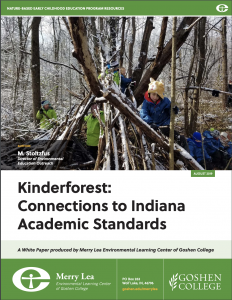
Kinderforest: Connections to Indiana Academic Standards
How does Kinderforest connect to academic standards? Although meeting academic standards is not the intent behind nature-based early childhood education, they are inevitably supported within well-designed and high-quality Forest Kindergartens. Learn about how this can be accomplished in our white paper:
Read More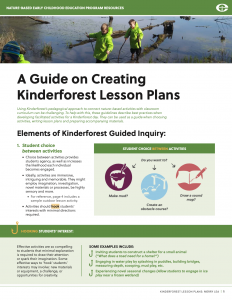
A Guide on Creating Kinderforest Lesson Plans
Using Kinderforest’s pedagogical approach to connect nature-based activities with classroom curriculum can be challenging. To help with this, these guidelines describe best practices when developing facilitated activities for a Kinderforest day. They can be used as a guide when choosing activities, writing lesson plans and preparing accompanying materials.
Read More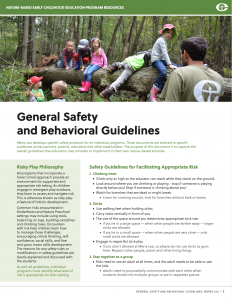
General Safety and Behavior Guidelines
This document captures the overall guidelines that educators may consider or implement in their own nature-based activities. Some of these guidelines include facilitating risky play, encouraging respectful behavior and adjusting to weather.
Read More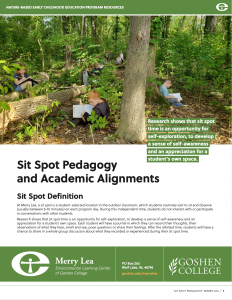
Sit Spot Pedagogy and Academic Alignments
Research shows that sit spot time is an opportunity for self-exploration, to develop a sense of self-awareness and an appreciation for a student’s own space. Each student has a journal to record their thoughts, their observations of what they hear, smell and see, pose questions or share their feelings.
Read MoreProgram Design & Implementation
We work with schools to adapt, create and implement nature-based practices or programs that get their students learning outside. Recognizing that each school’s needs and settings are unique, our partnership models are flexible and individualized. We provide varying degrees of implementation, from a 3-year track model to a consultation model.
We encourage schools we work with to consider:
- How families and the community can be involved as critical stakeholders. Families and community partners can be engaged in supporting student success through regular updates, engagement as active participants and many other contributions.
- How their NbECE program should be structured to meet its stated goals. This may influence the location of the program, its frequency or program elements.
No matter the type of partnership, we want to support educators in adapting and designing NbECE into their settings. We are a resource for training, philosophy development, classroom connections and other support as needed.
Reach out to Marcos Stoltzfus at marcosas@goshen.edu to learn more about partnering with us.
Regional & National Research
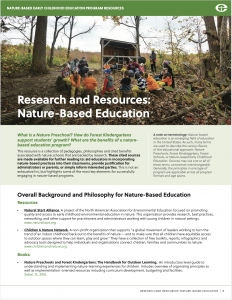
Research and Resources: Nature-based Education
What is a Nature Preschool? How do Forest Kindergartens support students’ growth? What are the benefits of a nature-based education program?
This resource is a collection of pedagogies, philosophies and cited benefits associated with nature schools that are back by research. These cited sources are hyperlinked and made available for further reading to: aid educators in incorporating nature-based practices into their classrooms, provide justification for administrators or parents, or simply inform interested parties.
Read MoreWe provide workshops, webinars and other professional development opportunities
Contact Us
Marcos Stoltzfus
Email: marcosas@goshen.edu
